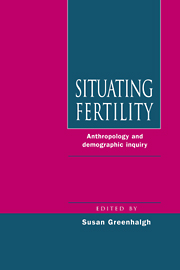Book contents
- Frontmatter
- Contents
- List of figures
- List of tables
- List of contributors
- Preface
- Conceiving reproduction: Trans-disciplinary views
- The social management of fertility
- 3 Agency and fertility: For an ethnography of practice
- 4 Invisible cultures: Poor women's networks and reproductive strategies in nineteenth-century Paris
- 5 The power of names: Illegitimacy in a Muslim community in Côte d'lvoire
- 6 Marginal members: Children of previous unions in Mende households in Sierra Leone
- Gender, class, and clan: The social inequality of reproduction
- Afterword: (Re)capturing reproduction for anthropology
- References
- Index
6 - Marginal members: Children of previous unions in Mende households in Sierra Leone
Published online by Cambridge University Press: 07 December 2009
- Frontmatter
- Contents
- List of figures
- List of tables
- List of contributors
- Preface
- Conceiving reproduction: Trans-disciplinary views
- The social management of fertility
- 3 Agency and fertility: For an ethnography of practice
- 4 Invisible cultures: Poor women's networks and reproductive strategies in nineteenth-century Paris
- 5 The power of names: Illegitimacy in a Muslim community in Côte d'lvoire
- 6 Marginal members: Children of previous unions in Mende households in Sierra Leone
- Gender, class, and clan: The social inequality of reproduction
- Afterword: (Re)capturing reproduction for anthropology
- References
- Index
Summary
The social roots of resource distribution
Just as resources are not distributed equally throughout national populations or communities, neither do they necessarily trickle down equitably within households. Stratification and differentiation can produce selective allocations of food, medical treatment, and educational support among children in the same household.
My previous work has attempted to instill interpretations of reproduction outcomes with a dynamic view, highlighting people's social efforts to manage or achieve demographic outcomes by restructuring household compositions and influencing obligations, rather than by acting strictly within the biological bounds or cultural norms that seem to be imposed on them (e.g., Bledsoe 1990b). Instead of being tethered to demographic facts, people try to tinker with them, to create or undo them, or to construe “official” (Bourdieu 1977) versions of them. By fostering in children, for example, adults try both to meet their current labor needs and to stake future claims in a broad array of children besides their own. Here I examine people's active efforts to shed those conjugal ties whose advantages have waned and build loyalty in new directions by tracing resource allocations to children.
Anthropological works have long accustomed us to the idea of accreting family members through reproduction or marriage; practices such as marriage, adoption, and fosterage are examples.
- Type
- Chapter
- Information
- Situating FertilityAnthropology and Demographic Inquiry, pp. 130 - 154Publisher: Cambridge University PressPrint publication year: 1995
- 10
- Cited by



